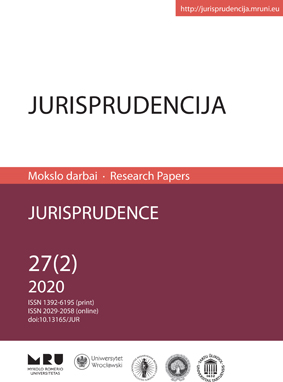BAUDŽIAMOSIOS TEISĖS NORMŲ TAIKYMAS TRAKŲ VAIVADIJOS PILIES TEISME XVIII A. ANTROJOJE PUSĖJE
THE APPLICATION OF CRIMINAL LAW NORMS IN TRAKAI CASTLE COURT (SECOND HALF OF THE 18TH CENTURY)
Author(s): Adam StankevičSubject(s): History of Law, Criminal Law
Published by: Mykolas Romeris University
Keywords: the Third Statute of Lithuania; Trakai Castle Court, Crimes; Court Practice; Second Half of the 18th Century;
Summary/Abstract: This article explores legal cases considered in the Trakai Castle Court in the second half of the eighteenth century that dealt with crimes against life, health and the honour of a person. Various opinions expressed in the historiography assert that during this period the strict norms of criminal law recorded in the Third Statute of Lithuania (adopted in 1558) were no longer meeting the needs of the nobility. Little research has been conducted on noble court practices as institutions that administered justice at this time. The article explores the laws on which this court based its verdicts handed down on criminals and asserts that in the vast majority of cases dealing with crimes against life, health and honour of a person, the Trakai Castle Court based its verdicts on the specific articles of the Third Statute of Lithuania. Notwithstanding, the latter were not always delivered in the way as provided for by the legal code. Indeed, the letter of the law was more strictly adhered to in cases of accused commoners, whereas the defendants of noble origin were treated more leniently by the court and received less severe punishments than those provided for by the laws.
Journal: Jurisprudencija
- Issue Year: 27/2020
- Issue No: 2
- Page Range: 411-430
- Page Count: 20
- Language: Lithuanian

